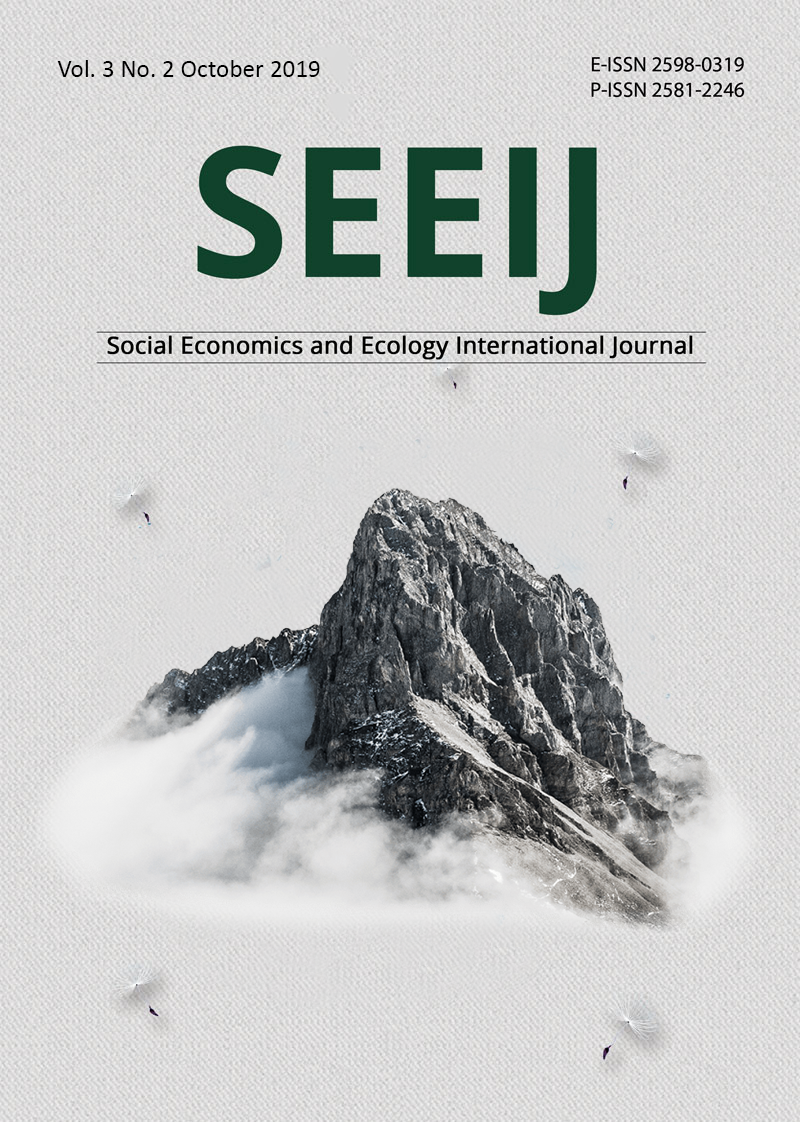Project CERITA – A Peacebuilding Initiative through Storytelling
DOI:
https://doi.org/10.21512/seeij.v3i2.6217Abstract
The rising intolerance in Indonesia is spiking and has become more confounding due to the heated political temperature following series of recent national elections. Religious identity is politicized in a magnitude that escalates religious fundamentalism and consequently, intolerance. Past research shown how personal uncertainty enable individuals to find closure through firm beliefs and ideologies. This article is aimed to understand how religious intolerance function as a coping mechanism towards perceived threats of challenged worldviews, and how it potentially strengthened when supported collectively. The paper aim to focus on efforts made in the area of promotion of tolerance and inclusivity, understanding the complexity of identity helps peacebuilding initiatives to manage religious intolerance. The paper will then highlight Project CERITA (Community Empowerment for Raising Inclusivity and Trust through Technology Application), a peacebuilding program initiated by The Habibie Center that conducted storytelling and dialog facilitation workshop in six cities in Indonesia to promote peace and counter religious intolerance.
References
Ada apa dengan milenial? Orientasi sosial, ekonomi dan politik. (Center for Strategic and International Studies, 2017)
Brown, R., & Hewstone, M. (2005). An integrative theory of intergroup contact. Advances in experimental social psychology, 37(37), 255-343.
Chongruksa, D., Prinyapol, P., Wadeng, Y., & Padungpong, C. (2010). Storytelling: program for multicultural understanding and respect among Thai-Buddhist and Thai-Muslim students. Procedia-Social and Behavioral Sciences, 5, 282-288.
Dovidio, J. F., Love, A., Schellhaas, F. M., & Hewstone, M. (2017). Reducing intergroup bias through intergroup contact: Twenty years of progress and future directions. Group Processes & Intergroup Relations, 20(5), 606-620.
Hamayotsu, K. (2013). The Limits of Civil Society in Democratic Indonesia: Media Freedom and Religious Intolerance. Journal of Contemporary Asia,43(4), 658-677.
Hogg, M. A. (2000). Subjective uncertainty reduction through self-categorization: A motivational theory of social identity processes. European review of social psychology, 11(1), 223-255.
Hogg, M. A. (2005). Uncertainty, social identity, and ideology. In Social identification in groups (pp. 203-229). Emerald Group Publishing Limited.
Hogg, M. A. (2007). Uncertainty–identity theory. Advances in experimental social psychology, 39, 69-126.
Hogg, M. A., & Adelman, J. (2013). Uncertainty–identity theory: Extreme groups, radical behavior, and authoritarian leadership. Journal of Social Issues, 69(3), 436-454.
Hogg, M. A., Adelman, J. R., & Blagg, R. D. (2010). Religion in the face of uncertainty: An account of religiousness. Personality and Social Psychology Review, 14(1), 72-83.
Kruglanski, A. W., Pierro, A., Mannetti, L., & De Grada, E. (2006). Groups as epistemic providers: need for closure and the unfolding of group-centrism. Psychological review, 113(1), 84.
McCoy, M. E. (2013). Purifying Islam in Post-Authoritarian Indonesia: Corporatist Metaphors and the Rise of Religious Intolerance. Rhetoric and Public Affairs,16(2), 275.
Menchik, J. (2014). Productive Intolerance: Godly Nationalism in Indonesia. Comparative Studies in Society and History,56(03), 591-621.
Milojević, I., & Izgarjan, A. (2014). Creating alternative futures through storytelling: A case study from Serbia. Futures, 57, 51-61.
Pettigrew, T. F., & Tropp, L. R. (2006). A meta-analytic test of intergroup contact theory. Journal of personality and social psychology, 90(5), 751.
PPIM, U. Jakarta. 2017. Api dalam Sekam: KeberAGAMAan Gen Z-Survei Nasional tentang Sikap Keberagamaan di Sekolah dan Universitas di Indonesia.
Senehi, J. (2002). Constructive storytelling: A peace process. Peace and Conflict Studies, 9(2), 41-63.
Stephan, W. G., Stephan, C. W., & Gudykunst, W. B. (1999). Anxiety in intergroup relations: A comparison of anxiety/uncertainty management theory and integrated threat theory. International Journal of Intercultural Relations, 23(4), 613-628.
Downloads
Published
How to Cite
Issue
Section
License
Copyright (c) 2020 Roosalina Wulandari

This work is licensed under a Creative Commons Attribution-NonCommercial 4.0 International License.
The Authors submitting a manuscript do so on the understanding that if accepted for publication, copyright of the article shall be assigned to SEEIJ Community Empowerment (CE) Bina Nusantara University as publisher of the journal.
Copyright encompasses exclusive rights to reproduce and deliver the article in all form and media, including reprints, photographs, microfilms and any other similar reproductions, as well as translations. The reproduction of any part of this journal, its storage in databases and its transmission by any form or media, such as electronic, electrostatic and mechanical copies, photocopies, recordings, magnetic media, etc., will be allowed only with a written permission from SEEIJ Community Empwerment (CE) Bina Nusantara University.
SEEIJ, the Editors and the reviewer make every effort to ensure that no wrong or misleading data, opinions or statements be published in the journal. In any way, the contents of the articles and advertisements published in the SEEIJ are sole and exclusive responsibility of their respective authors and advertisers.

This work is licensed under a Creative Commons Attribution-NonCommercial 4.0 International License.









